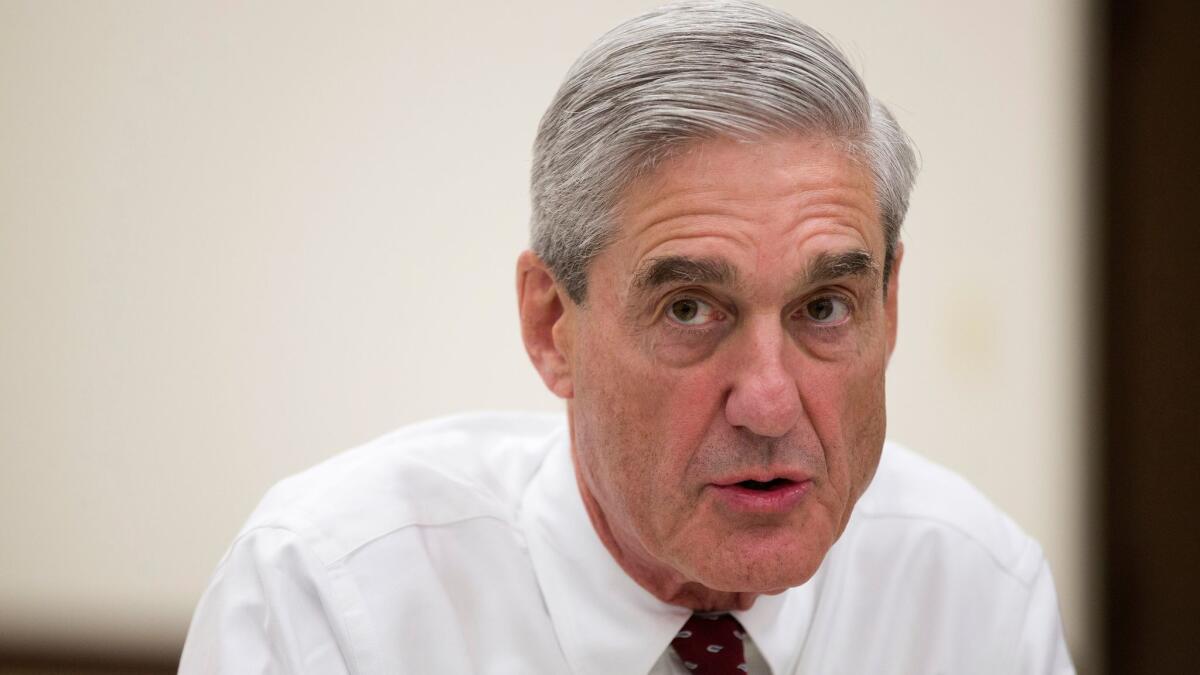Trump may not have the legal power to fire Mueller, the special counsel

President Trump is at least thinking about firing special counsel Robert S. Mueller III, according to a close confidant of the president’s who visited the White House on Monday.
Leading Republicans, including House Speaker Paul D. Ryan, have made it clear they see no reason to remove Mueller and would prefer he be allowed to finish the probe.
But suppose Trump ignores their advice. Does he actually have the legal power to fire the special counsel, who is leading the investigation into Russian interference in the 2016 election and examining possible coordination by Trump’s associates?
That’s an unsettled legal issue.
The Justice Department has detailed regulations covering the powers of a special counsel, how one can be appointed and when one can be fired. Those regulations specify that a special counsel can be fired only for “misconduct, dereliction of duty, incapacity, conflict of interest, or for other good cause, including violation of departmental policies.” The reason must be stated in writing and only the attorney general can actually carry out the firing.
In this case, because Atty. Gen. Jeff Sessions has stepped aside from any role in the Russia investigation -- recusal is the legal term -- Deputy Atty. Gen. Rod J. Rosenstein serves as acting attorney general for all matters related to the special counsel. So under the regulations, he’s the ultimate decision maker.
That much is pretty clear. After that, the questions start.
As Jack Goldsmith, a Harvard Law professor and former top Bush administration Justice Department official, wrote in a blog post, an important constitutional issue exists on whether the president’s authority over executive branch officials can be limited that way.
Trump might assert he has authority to fire Mueller on his own, courts might or might not agree.
The president might also assert that proper cause exists to fire Mueller. Already, some of his allies have suggested that Mueller has a conflict of interest. Their argument, ironically, involves the fact that Mueller’s law firm has represented members of Trump’s family. However, the Justice Department ethics office already has ruled that is not a conflict.
Another possibility would be for Trump to order Rosenstein to fire Mueller. If Rosenstein refused, Trump could fire him and move on to find another Justice Department official who would say yes. That scenario would be similar to the “Saturday Night Massacre” in which President Nixon ordered the firing of the Watergate special prosecutor, Archibald Cox. The two top officials of the Justice Department quit in protest rather than carry out the order.
The shortage of Senate-confirmed officials at the Justice Department who would potentially have the authority to carry out such an order would complicate matters further if Rosenstein were to refuse. On Tuesday, Rosenstein signaled at a Senate hearing that he would fire Mueller only for good cause and that he saw no reason currently to do so.
Finally, there’s the question of whether Congress would consider a move to fire Mueller an impeachable offense. In Nixon’s case, “abuse of power,” rather than specific criminal acts, formed the basis for several articles of impeachment. What constitutes such an abuse is a political issue more than a legal one, so a lot might depend on public reaction.
Essential Washington: Full coverage of the Trump administration »
More to Read
Get the L.A. Times Politics newsletter
Deeply reported insights into legislation, politics and policy from Sacramento, Washington and beyond. In your inbox three times per week.
You may occasionally receive promotional content from the Los Angeles Times.







